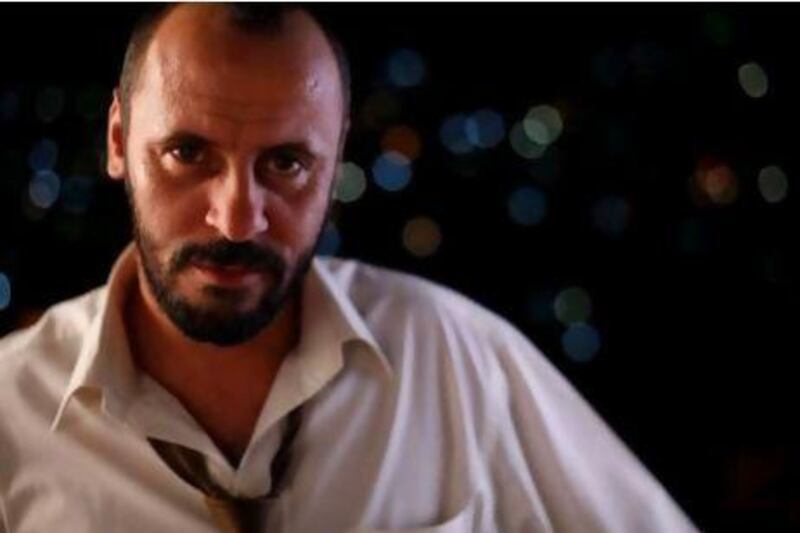If you've watched more than a couple of Middle Eastern films produced over the past few years, chances are you've seen Ali Suliman in action. It would be no exaggeration to claim that the Palestinian actor has been somewhat prolific since his first major role in 2005's Academy Award-nominated and Golden Globe-winning Paradise Now, building up an impressive body of work and becoming one of the region's most sought-after leading men.
At last year's Dubai International Film Festival, Suliman featured in not one but two titles, the Jordanian and UAE co-production The Last Friday, and one of the six shorts that made up Do Not Forget Me Istanbul. He eventually took home the Best Actor award for The Last Friday, in which he plays a downbeat driver in Amman whose life is slowly slipping from under him. Perhaps predictably, however, Suliman couldn't be in Dubai to collect the glass statuette; he was filming elsewhere.
"I was really lucky last year," says Suliman from the Berlinale film festival, where The Last Friday has been screening. "I was really busy. When Dubai was on, I was in the middle of Lebanon with Ziad Doueiri, the director of West Beyrouth, shooting his new feature, The Attack."
Busy is a word that Suliman, who is based in Haifa, has probably had to use a lot of late. Following Paradise Now, he starred as a Palestinian lawyer fighting to save a woman's orchard from destruction in 2008's award-winning The Lemon Tree, and then on to The Time That Remains from the iconic Palestinian director Elia Suleiman, whom he worked with for a much smaller role in Chronicles of a Disappearance back in 1996. In 2008, he also linked up with rising name Najwa Najjar for her debut feature, Pomegranates and Myrrh, in which he played a dance teacher in Ramallah.
But alongside his regional appearances, Suliman has joined a small, elite group of Middle East actors who have managed to pick up sizeable roles in Hollywood. Following on from the international success of Paradise Now, which saw him play the role of a Palestinian preparing for a suicide attack, Suliman got an agent in the US and began interviewing with casting directors. The roles didn't take long to arrive. In 2007 came The Kingdom, in which he played a Saudi police sergeant alongside Jamie Foxx and Jennifer Garner. A year later, he fulfilled "a dream" by working with Ridley Scott, portraying an architect set up as a jihadist by Leonardo DiCaprio in Body of Lies.
"For me, working with Ridley was one of the greatest experiences," he says. "I was shaking at first."
True to form, Suliman was actually working on another movie while filming Body of Lies. So determined was Najwa Najjar that he would appear in Pomegranates - which was to shoot at the same time - that the Palestinian director said she'd work around him, with him moving between sets on his days not filming for Scott. "I had a really hard time," admits Suliman. "I was shooting two different movies. I was filming in Morocco with Ridley Scott where I had my own trailer, and then I'd fly back to Palestine and have no chair to sit on. It was a big schism."
Despite the lack of seating opportunities available, Pomegranates and Myrrh and other low-budget regional productions still provide a kick for Suliman, showing the passion of filmmaking. "Films such as The Last Friday may have no budget, but you can see the spirit of the people - they really want to do movies," he says. "I saw the script and it was great. I wasn't sure if it was something that would be a success, or if it would be professional, but I believed in the script and the director."
Suliman says he's now in the luxurious position that he gets a fair number of scripts from filmmakers who want him on board their productions, allowing him to pick and choose. He's even had a few from Hollywood that he turned down. "I didn't want to repeat the cliché that Arabs are terrorists," he says. "It doesn't say something to me. I think to be in that position you should take things that change perceptions, if you can."
In The Kingdom, which was partly filmed in Abu Dhabi, Suliman claims that the story was initially going to conclude with his character turning on the US government agents and killing them. "I had a big conversation about it with [the director] Peter Berg and he listened to me and we changed it," he says. "I thought we couldn't close the whole doors and say everything is black. This is what I hate in American movies, that there is just good and bad. But there are colours in between."
In 2010, Suliman looked into his own heritage, with two non-film productions covering the formation of Israel in 1948. First there was the stage play I Am Yusuf and This Is My Brother at London's The Young Vic theatre, and then the British TV serial The Promise, both of which looked at Palestine in the lead up to the UN partition and Nakba, as British troops struggle to keep the peace in their mandate between Arabs and Jews.
Suliman, whose parents were uprooted from their village near Nazareth, says it was eye-opening to research that time for his character on The Promise, a Palestinian working for the British army, who eventually loses his home after the conflict. "I'm the son of people who really suffered in 1948. Some went to refugee camps in Lebanon, others to Syria and Jordan, and some stayed there. I know the history, but had to go deep and look at it from a different perspective, and I saw that there are people who think differently. It wasn't black and white."
The village of Suliman's parents still exists, but is now a Jewish settlement. "I can see it, but they have put up big electric gates so nobody can go inside. I remember we used to go there to pick za'atar. Now it's forbidden."
The Promise was widely praised, highlighting a period of history often overlooked by western audiences. And it's a period Suliman hopes to return to when he finally gets to have his turn behind the camera. "I have a story that I really want to tell - it's about a man, it's a real story. But I can't reveal too much because it's very complicated and dangerous. The family is still alive, so I need to take stories and go between the lines."
Although he says he already has producers ready to come on board for his project, Suliman says it could take upwards of two years to develop the script. But this is, of course, assuming he has time.
He's currently in discussions with the acclaimed Ramallah-based filmmaker Rashid Masharawi and also "a Danish director" about future productions. And then there's Ziad Doueiri's The Attack, based on a book by Yasmina Khadra, which Suliman says is now in post-production, with hopes to premiere it at Cannes.
Whether Suliman gets to taste the sea air in the French Riviera later this year or not, he's likely to be a man who'll be making regular festival appearances in the future.
Follow us on Twitter and keep up to date with the latest in arts and lifestyle news at twitter.com/LifeNationalUAE





